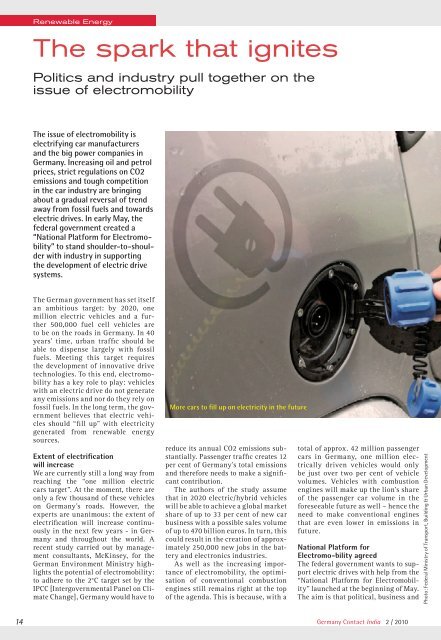Germany Contact - Wolfgang Lehmacher
Germany Contact - Wolfgang Lehmacher
Germany Contact - Wolfgang Lehmacher
Create successful ePaper yourself
Turn your PDF publications into a flip-book with our unique Google optimized e-Paper software.
Renewable Energy<br />
The spark that ignites<br />
Politics and industry pull together on the<br />
issue of electromobility<br />
The issue of electromobility is<br />
electrifying car manufacturers<br />
and the big power companies in<br />
<strong>Germany</strong>. Increasing oil and petrol<br />
prices, strict regulations on CO2<br />
emissions and tough competition<br />
in the car industry are bringing<br />
about a gradual reversal of trend<br />
away from fossil fuels and towards<br />
electric drives. In early May, the<br />
federal government created a<br />
“National Platform for Electromobility”<br />
to stand shoulder-to-shoulder<br />
with industry in supporting<br />
the development of electric drive<br />
systems.<br />
The German government has set itself<br />
an ambitious target: by 2020, one<br />
million electric vehicles and a further<br />
500,000 fuel cell vehicles are<br />
to be on the roads in <strong>Germany</strong>. In 40<br />
years’ time, urban traffi c should be<br />
able to dispense largely with fossil<br />
fuels. Meeting this target requires<br />
the development of innovative drive<br />
technologies. To this end, electromobility<br />
has a key role to play: vehicles<br />
with an electric drive do not generate<br />
any emissions and nor do they rely on<br />
fossil fuels. In the long term, the government<br />
believes that electric vehicles<br />
should “fi ll up” with electricity<br />
generated from renewable energy<br />
sources.<br />
Extent of electrifi cation<br />
will increase<br />
We are currently still a long way from<br />
reaching the “one million electric<br />
cars target”. At the moment, there are<br />
only a few thousand of these vehicles<br />
on <strong>Germany</strong>’s roads. However, the<br />
experts are unanimous: the extent of<br />
electrifi cation will increase continuously<br />
in the next few years - in <strong>Germany</strong><br />
and throughout the world. A<br />
recent study carried out by management<br />
consultants, McKinsey, for the<br />
German Environment Ministry highlights<br />
the potential of electromobility:<br />
to adhere to the 2°C target set by the<br />
IPCC [Intergovernmental Panel on Climate<br />
Change], <strong>Germany</strong> would have to<br />
More cars to fi ll up on electricity in the future<br />
reduce its annual CO2 emissions substantially.<br />
Passenger traffi c creates 12<br />
per cent of <strong>Germany</strong>’s total emissions<br />
and therefore needs to make a signifi -<br />
cant contribution.<br />
The authors of the study assume<br />
that in 2020 electric/hybrid vehicles<br />
will be able to achieve a global market<br />
share of up to 33 per cent of new car<br />
business with a possible sales volume<br />
of up to 470 billion euros. In turn, this<br />
could result in the creation of approximately<br />
250,000 new jobs in the battery<br />
and electronics industries.<br />
As well as the increasing importance<br />
of electromobility, the optimisation<br />
of conventional combustion<br />
engines still remains right at the top<br />
of the agenda. This is because, with a<br />
total of approx. 42 million passenger<br />
cars in <strong>Germany</strong>, one million electrically<br />
driven vehicles would only<br />
be just over two per cent of vehicle<br />
volumes. Vehicles with combustion<br />
engines will make up the lion’s share<br />
of the passenger car volume in the<br />
foreseeable future as well – hence the<br />
need to make conventional engines<br />
that are even lower in emissions in<br />
future.<br />
National Platform for<br />
Electromo-bility agreed<br />
The federal government wants to support<br />
electric drives with help from the<br />
“National Platform for Electromobility”<br />
launched at the beginning of May.<br />
The aim is that political, business and<br />
14 <strong>Germany</strong> <strong>Contact</strong> India 2 / 2010<br />
Photo: Federal Ministry of Transport, Building & Urban Development



